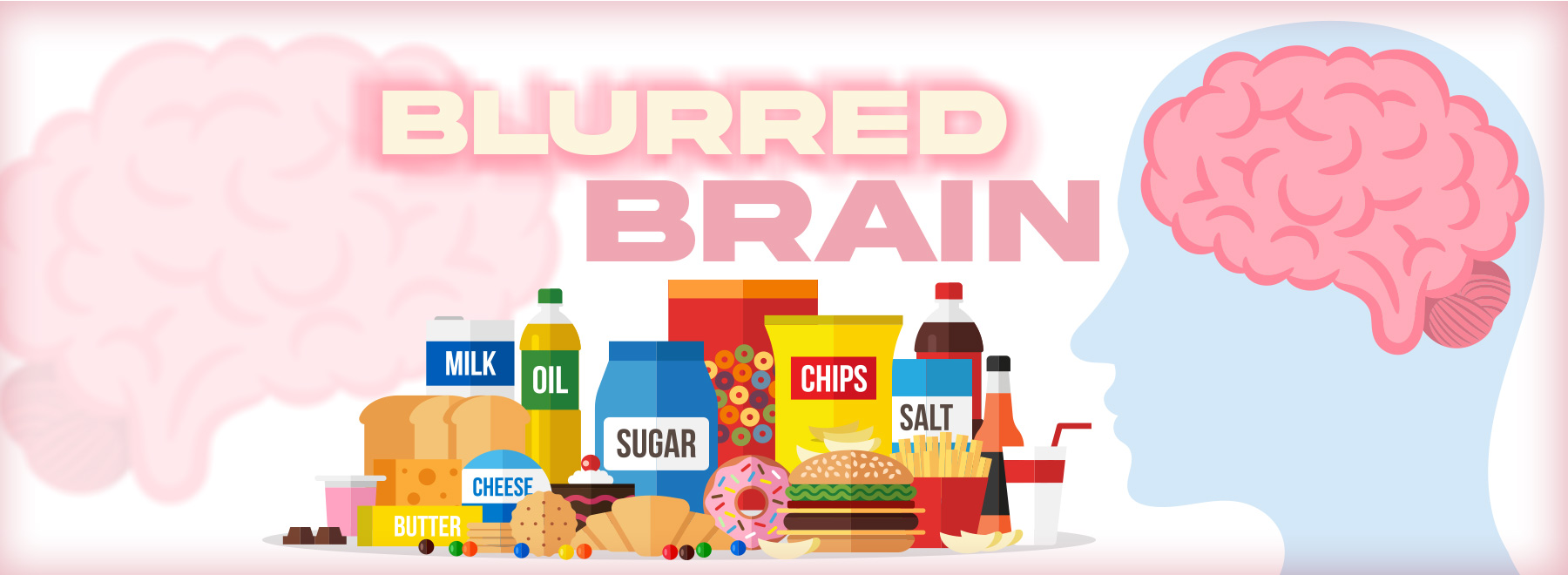Blurred brain: Diets high in packaged foods linked to poor learning, mental health
This is a story about a Ritz cracker vs. a Triscuit.
It’s a story about an apple vs. an apple pie, a baked potato vs. a potato chip.
It’s a story about ultra-processed foods, about what they can do to your emotions and to the place where those emotions reside. It’s about why you think, and feel, what you eat.

“Our brain and our gut are intimately linked together,” said Dr. Danny Burgess, associate professor of psychiatry and human behavior, and director of the Center for Integrative Health at the University of Mississippi Medical Center.
“So, there is no question that what we eat influences our mental health.”
The link between the gut and brain is the brain’s vagus nerve. What happens in the vagus doesn’t stay in the vagus. The nerve is responsible for several bodily functions, including digestion. It’s a two-way street: What you put in the gut could also affect your brain.
When you consume ultra-processed foods, or at least a lot of them, unwelcome things can happen. One way to identify these UPF’s is to note the number of ingredients listed on the product label and whether their names put you in mind of a science experiment.
“If it sounds like a chemistry lab, then it is a highly-processed or ultra-processed food,” Burgess said. “If you see ingredients that likely would not be in anyone's kitchen, then it is an ultra-processed food.
“Noting whether products contain ingredients to prolong the life of the food, make it more convenient to prepare, or enhance its taste (cosmetic additives) are good ways to identify ultra-processed foods.”
To illustrate, Burgess likes to compare the Triscuits’ ingredient lineup against the Ritz crackers’ roster.
A Triscuit has only three main constituents: whole grain wheat, vegetable oil and sea salt. Depending on how you tally its parts, a Ritz has at least 15, including sodium phosphate.

“The original form of a food product is unprocessed; as we add more ingredients and change the form, it becomes more and more processed,” said Lauren Turner, a nurse practitioner in the Department of Preventive Medicine’s Lifestyle Medicine Clinic at UMMC and also a collaborating member of the Center for Integrative Health team.
Raw corn-on-the-cob: original. Frosted (corn) Flakes and Fritos’ corn chips: ultra-processed. To that latter category, Turner said, we may also add these tasty examples: Honey Buns; sausage; hot dogs; turkey bacon; frozen, pre-made meals – pizza, chicken nuggets, fish sticks; packaged cookies, pastries and cakes; instant noodles; packaged macaroni and cheese; canned soups.
“It can be anything that has a very long shelf life,” Turner said. “Even juices and sodas or sweetened drinks. Anything that has preservatives, flavoring or coloring added.”
Turner points out, however, that “not all food processing is a negative thing. For example, pasteurization is a form of food processing and is absolutely crucial for safety,” she said.
“But when a food has too much done to it, it often has a lot of the nutrients removed, including fiber, vitamins, minerals, etc.; and other things added such as saturated fat, sodium and sugar.”
The connection between a regimen of these packaged foods and physical breakdowns such as morbid obesity, diabetes, hypertension, heart disease and some cancers should be well known by now. What may be less familiar is the association between our moods/mental health and diet – for good or for ill.
On the good side, studies have shown that certain types of flavonoids may be useful for treating depression. Many fruits and vegetables are rich sources of these plant compounds and include grapes, berries, tomatoes, onions, kale and lettuce.
Another investigation showed that flavonoid intake may slow the decline of reasoning, learning abilities and other cognitive skills.
“There are also plenty of studies that show people who consistently maintain a diet that is low in processed foods and refined sugars, i.e., the Mediterranean diet, are at a much lower risk of developing depression/anxiety/dementia compared to those with a more Western diet,” Burgess said.
On the flip side: “If we feed our brain with an excess of processed, ‘unnatural’ food products and deprive it of healthy nutrients and minerals, the consequences are mental health disorders and cognitive decline,” Burgess said.
Chemistry, pure and simple, is at play. “The majority of serotonin, one of our ‘feel-good’ hormones responsible for happiness and pleasure, is produced in the gut,” Turner said.
An unhealthy gut, a result of the foods we eat, affects the production and distribution of serotonin, Burgess said.
“So, it makes sense that improper nutrients or interrupted absorption can negatively affect your mood and energy level,” Turner added.
It gets complicated. “Highly-processed foods are soothing and addictive, as they generally stimulate our dopamine response,” Burgess said.
In other words, who hasn’t wanted to face-plant onto a Honey Bun after a bad grade or another boil-water alert?
“There is a tendency to associate eating these foods when stressed/depressed/anxious, which typically leads to overeating,” Burgess said. “Which leads to a whole host of physical and emotional problems.”
That is why Turner recommends, for instance, eating a baked potato instead of French fries or potato chips; an apple instead of apple juice, sauce or pie; Thanksgiving turkey instead of deli turkey or turkey bacon. And whole grains, nuts, beans at all times, or at least many times. As for refined sugar – not so much.
“The American Heart Association recommends limiting added sugar to 100 calories per day for women and 150 calories for men,” Turner said. By comparison, a 12-ounce can of Coca-Cola has 39 grams of sugar and 140 calories.
Sodium, or salt, too, adds up fast. “A good rule of thumb is that a teaspoon a day is more than what you should have,” Turner said. “Many things we eat already have salt in them, and we don’t realize it.
“Onion, garlic, parsley, lemon, etc., are good for you and are healthier and tasty alternatives to salt.”
Turner is a realist. She recognizes that some people might prefer to give up altogether than to give up bacon.
“Processed food is quick, convenient and often cheaper,” she said. “It is also readily available in areas that may not have access to fresh foods. It also tastes good.
“So, should we never eat bacon? Not necessarily. It’s important to focus on the things we CAN eat. Nothing is off-limits, everything in moderation. We just want to be conscious of the health risks, and choose healthier, unprocessed, or less processed, foods most of the time.
“Just remember that the better you eat, the better you feel.”
The above article appears in CONSULT, UMMC’s monthly e-newsletter sharing news about cutting-edge clinical and health science education advances and innovative biomedical research at the Medical Center and giving you tips and suggestions on how you and the people you love can live a healthier life. Click here and enter your email address to receive CONSULT free of charge. You may cancel at any time.



